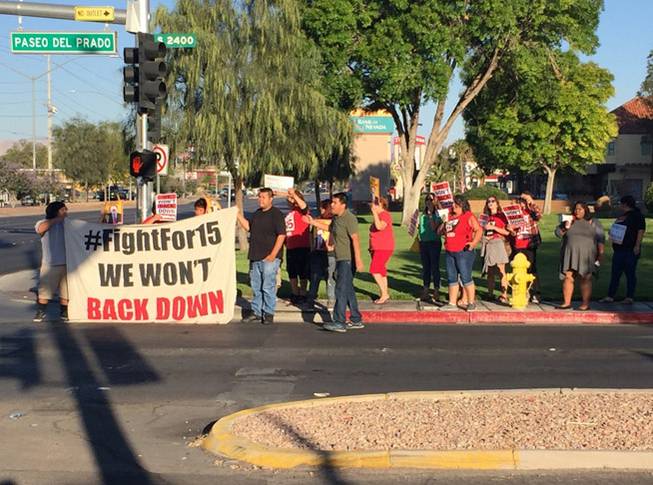
Demonstrators seeking a hike in the minimum wage to $15 an hour rally at Sahara Avenue and Paseo Del Prado on Wednesday, May 24, 2017.
Friday, May 31, 2019 | 2 a.m.
Related Content
CARSON CITY — Democrats in the Legislature are fighting to raise the state's minimum wage on two fronts, via the statutory method and as a proposed amendment to the Nevada Constitution.
Assembly Bill 456 and Assembly Joint Resolution 10, both of which would result in minimum wage raises of varying amounts, are still moving through the legislative process with just days left in the 2019 session. They’ve passed through the Assembly but continue to await action by the Senate.
“I think you can do it both ways. You can do something statutorily, which could constantly be changed in the future because we can’t bind the hands of a future Legislature, of course,” said Assemblywoman Maggie Carlton, D-Las Vegas. “When you put something in the Constitution, it’s a more consistent, solid message and implementation.”
The minimum wage in Nevada is currently $7.25 an hour for employees who are offered some form of on-the-job health coverage. That number increases to $8.25 an hour for employees who are offered health coverage by their employer.
Under AB 456, the minimum wage would jump to $8-$9 an hour in July 2020 based on whether health care coverage is offered to employees. The minimum wage then would increase by 75 cents per hour annually in July until it hits $11-$12, which would be in 2024 if future Legislatures don't change or rescind the law.
Carlton said the staggered increase was designed to ease both employees and employers into the new rate, something she compared to what union workers now see.
“I know when we do union contracts, we do a ramping up. You do so much a year, so much a year, so much a year,” she said. “(It) gives the employee and the owner a chance to say ‘OK, this is what my budget needs to look like this year.’”
AJR 10, introduced late last week, would skip the staggered steps. As is currently written, it would set the minimum wage at $12 — or the federal minimum wage, whatever is higher — but it wouldn't take effect until July 2024. Proposed constitutional amendments must be approved by two consecutive sessions of the Legislature and then approved by a majority in a public vote before the Constitution is changed. Thus, AJR 10 would have to be approved by the current Legislature, then be passed by lawmakers in the 2021 session before going to voters in the 2022 general election.
So, if both SB 456 and AJR 10 are ultimately approved, the hourly minimum wage for all Nevadans would be $12 by 2024, regardless of health coverage options offered by employers.
“We have had employers abuse this and say they’re providing health care and getting to pay the lower wage,” Carlton said. “But when you look at the cost of the health care, those employees would never be able to afford that health care and pay the rent and feed their kids and put gas in their cars. There’s no way. There’s no real standard for what affordable health care is.”
Gov. Steve Sisolak has expressed his support for a minimum wage hike in the past, but he has said he would not support one that increased the wage all at once.
The Nevada Policy Research Institute, a free-market conservative think tank, opposed AB 456 Wednesday at a Senate Commerce and Labor Committee meeting. In a statement, Daniel Honchariw, a senior policy analyst with the institute, said it could harm job prospects for certain Nevadans.
“Labor is a commodity and, like all other commodities, is subject to the economic laws of supply and demand,” he said. “By raising the minimum wage by nearly 50% over the next several years, AB 456 will deny job opportunities to those most in need of gaining work experience, while likely requiring certain businesses to lay off employees and/or reduce hours worked.”
Carlton, who also works for the Culinary Union, said that the arguments against the raise were “full of holes.”
“We’re a nonprofit, we live off fundraising and grants,” she said. “So, the argument that it’s going to hurt a business I just find totally insulting. If a nonprofit can do this and do it well, and I know a lot of nonprofits that do this — I mean, it’s our responsibility to treat our employees well.”
She said that not paying employees enough could force people to turn to social safety nets and shift the burden from employers to taxpayers.
“Remember, every time an employee doesn’t make enough money and someone has to subsidize it, that’s on your electric bill, your gas bill (and) everybody else’s,” she said. “So we all pick that cost up.?
In a statement after both measures passed the Assembly earlier this week, Speaker Jason Frierson, D-Las Vegas, said that the measures would “positively impact” many Nevadans.
“People of all ages work minimum wage jobs to make ends meet,” he said. “AJR 10 and AB 456 seek to improve conditions for those hard-working Nevadans who are struggling to provide for themselves and their families.”
